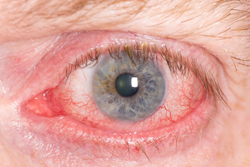Looking for new delivery systems for eye medications
The eye has two main anatomical segments: the anterior segment and the posterior segment. Diseases affecting the latter are responsible for causing visual impairment and blindness. They include age-related macular degeneration; currently, around 6.5 million Europeans suffer from this eye or ocular condition. Within the past decade, drug delivery to the eye has become important for treating several vision-threatening eye disorders. However, the anatomy, physiology, and biochemistry of the eye make it resistant to foreign substances. A new approach to bring about sustained drug delivery to the back part of the eye is urgently required. To meet this unmet clinical demand, a European consortium was established bringing together five university research groups and a life sciences company. Together they formed the EU-funded 'Peptide-based nanoparticles as ocular drug delivery vehicles' (Panoptes) project. Peptides are short chains of amino acids. The Panoptes project's aim is to develop ways to manufacture novel peptide-based microparticles, nanoparticles and nanocapsules to deliver drugs where they are needed in the eye. These biodegradable and biocompatible materials will be used as containers for the loading, controlled release and cellular delivery of therapeutic molecules. To date, the project has produced polypeptides by chemical methods and through protein engineering. Initial studies have been performed and methods for assessing the drug loading and release characteristics have been validated. In addition, protocols have now been established to test injectable formulations of nanoparticles as new drug delivery agents. Research work is continuing in the Panoptes project. If successful, the research will produce a step-change improvement in sustained drug delivery to the posterior segment of the eye. At the same time, it will enhance both the care of Europe's patients and the competitiveness of European industry.







